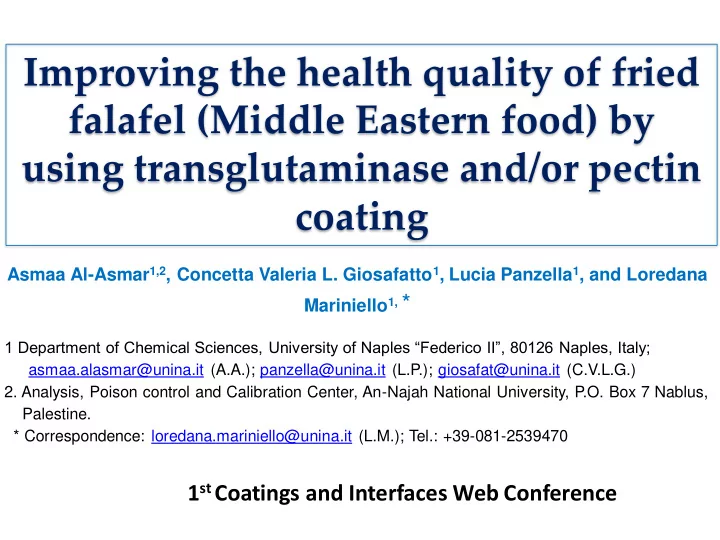

Improving the health quality of fried falafel (Middle Eastern food) by using transglutaminase and/or pectin coating Asmaa Al-Asmar 1,2 , Concetta Valeria L. Giosafatto 1 , Lucia Panzella 1 , and Loredana Mariniello 1, * 1 Department of Chemical Sciences, University of Naples “Federico II”, 80126 Naples, Italy; asmaa.alasmar@unina.it (A.A.); panzella@unina.it (L.P.); giosafat@unina.it (C.V.L.G.) 2. Analysis, Poison control and Calibration Center, An-Najah National University, P.O. Box 7 Nablus, Palestine. * Correspondence: loredana.mariniello@unina.it (L.M.); Tel.: +39-081-2539470 1 st Coatings and Interfaces Web Conference
Background Falafel is traditionally fast and street food in Middle Eastern. Falafel dough is made of a mixture of soaked ground chickpeas, parsley, onions, spices and leavened by sodium bicarbonate. According to European Food Safety Authority (EFSA), acrylamide (ACR) is produced in numerous baked and fried foods, including French fries, potato crisps, breads, biscuits, and coffee (roasted beans). EFSA scientists conclude that ACR is an health concern (EFSA, 2015).
How can ACR be formed in foods? ACR Free Reducing asparagine sugars low +120 ° C moisture frying, baking, roasting This reaction is part of the Maillard reaction
Objectives The objective of this study was to evaluate the effect of both TGase and PEC-based coating solution on the ACR formation and quality of the fried falafel. Oil and water content, texture analysis profile, and in vitro gastric digestion were investigated. Results demonstrated the effectiveness of our coatings providing healthier falafel.
Transglutaminase (E.C. 2.3.2.13, TGase) TGase-mediated crosslinking can give rise to intra-molecular (A) and inter-molecular (B) isopeptidic bond.
Preparation of falafel balls Soaking 200 g of dried chickpeas with 600 mL of water for overnight Removing the chickpeas from the water Onion, parsley, falafel spices, salt and sodium bicarbonate was added to mixture Fig. 1 Blending for 2 min Preparation of balls by using falafel scoops (Fig. 1); frying them in hot oil (180°C) for 5 min
Falafel prepared in the presences of TGase add TGase : 0, 5, 20 U/g protein incubation time : 2h at 37 ⁰C Falafel dough Frying the falafel balls at 180± 5⁰C for 5 min
SDS-page of falafel dough and fried falafel TGase (U/g protein)
Dipping and frying protocol Preparing falafel dough with and without TGase 5, 20 U/g Freezing for 2h at – 20 ⁰C dipped 30s in Water as a control PEC 1% pH 7.5 Control Freezing for 30 min at – 20 ° C Fried at 180 ± 5 °C for 5min
Effect of different concentrations of TGase on ACR content of fried falafel without dipping dipping into 1% PEC- based
Water content of fried falafel balls without dipping dipping into 1% PEC- based
Oil content of fried falafel balls without dipping dipping into 1% PEC- based
Texture Profile Analysis (TPA) of falafel balls Falafel type Hardness Chewiness Gumminess (N) (N .mm ) (N) Traditional falafel 56.41 ± 5.50 184.28 ± 3.10 23.20 ± 1.20 without TGase 52.22 ± 5.30 180.97 ± 2.80 22.15 ± 1.20 70.88 ± 3.25 a 238.44 ± 2.70 a 38.87 ± 1.50 a + TGase 5U/g + TGase 20U/g 96.57 ± 4.80 a 280.25 ± 15.10 a 49.64 ± 3.80 a Dipped in water 52.18 ± 3.40 178.13 ± 4.10 21.42 ± 3.01 Dipped in 1% PEC 58.13 ± 4.90 183.23 ± 11.69 23.29 ± 4.50 +TGase (5U/g) and dipped in 1% 114.31 ± 8.20 a,b 453.18 ± 11.30 a,b 67.60 ± 4.50 a,b PEC + TGase (20U/g) and dipped in 1% 136.07 ± 12.28 a,b 518.50 ± 18.05 a,b 78.24 ± 2.01 a,b PEC
SDS- PAGE profile of falafel subjected to in vitro experiments without TGase with TGase (20 U/g)
Densitometry analysis of the SDS- PAGE bands
Conclusions TGase enzyme was able to reduce the ACR content of falafel balls, and this reduction was even more evident when TGase – prepared balls were coated by PEC, that was able to decrease the ACR concentration also in the falafel without TGase treatment. TGase also had an effect on the texture profile parameters. On the other hand, the PEC coating protection allowed to reduce the oil content of this food product, either treated or not by means of TGase. Protein gastric digestion carried out under physiological conditions showed that enzymatic treatment slightly decreased the digestion rate, although the proteins were fully digested in both unprocessed and TGase-processed system.
Recommend
More recommend